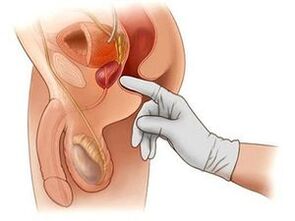Currently, the question of how to determine prostatitis worries more than half of men. Now we are talking about representatives of the stronger sex at the age of 30-35, but this figure is decreasing, young people can also suffer from this disease. At the first signs, it is necessary to contact a urologist and undergo treatment. For this, it is important to know how to recognize prostatitis on your own.
Signs of an acute form
In the case of an acute form, it is quite easy to figure out how to identify prostatitis in men. In fact, this is an inflammatory process caused by complications after a cold. It can be hypothermia, SARS or acute respiratory infections. It is a viral, fungal or bacterial infection that accidentally enters the prostate.

In this case, there are several symptoms of the disease of prostatitis - and how to determine it is easy for everyone to understand:
- The temperature is above 38 degrees.
- Nausea and vomiting due to intoxication.
- Chills and weakness.
- Muscle pain.
- Discomfort in the lower abdomen.
- Pain when urinating.
- Small amount of blood in the urine.
- Violation of sexual function.
In this situation, you should immediately contact a specialist. The main feature of the acute form is that it is treated quickly and easily. After undergoing treatment and recovery, a man can be sure to get rid of all symptoms, including the normalization of sexual function.
Chronic Disease Symptoms
The chronic form is somewhat more dangerous. In this case, the symptoms are more stable, long-term complex treatment is required. Often, even after that, relapses can occur. It is necessary to consult a doctor as soon as possible, only with exposure at an early stage there is hope for recovery. Symptoms include the following:
- The temperature rises to 37 degrees. This happens intermittently, not on a continuous basis.
- Frequent urge to go to the toilet. At the same time, urination is disturbed, the stream is very weak.
- Symptom of pain. Unpleasant sensations can be given to the sacrum and scrotum.
- Erectile dysfunction, sexual life is greatly disturbed.
All these symptoms greatly disturb any member of the stronger sex. Therefore, it is important to know in advance how to understand that you have prostatitis and how to act.
Difference with other diseases
Finding out about the disease on your own is difficult. Symptoms can be similar for a variety of diagnoses. Men suffer from problems with the genitourinary system for several reasons. These can be common illnesses:
- Orchitis and epididymitis cause irritation of the testicles. As a result, there may be similar signs, in addition there will be sharp pain when touching the scrotum.
- Urethritis is accompanied by sharp pains in the urinary canal, sometimes it drops the abdomen in case of complications.
- Cystitis is accompanied by a constant urge to go to the toilet and is often associated with urethritis.
- Pyelonephritis means problems with the kidneys, there will be pain in the back, as well as the presence of blood in the urine.
Many of the symptoms are indeed very similar. That is why prostatitis should be determined exclusively by a professional. The specialist will conduct a comprehensive examination and select an individual treatment.
Professional diagnosis
Since the symptoms can be similar to many other diagnoses, if any signs appear, you should seek medical attention and not self-medicate. The doctor must carry out a complete examination:
- Rectal palpation. Through the colon, the doctor will be able to feel the prostate and assess its condition and size.
- Cytology. A sample of prostate secretion is sent to a lab and tested for a variety of bacteria and infections.
- Urine analysis. Be sure to do it in a special way. For a visit to the toilet, three cups are filled: at the beginning, at the end and in the middle of urination.
- Prostate ultrasound is performed rectally, it can be used to examine the prostate and the area around it on the device.
- Rheography is performed using electrodes, the reaction of the prostate to irritation is measured.
- Uroflowmetry checks for urinary problems. This applies to speed, duration and periods between trips to the toilet.
Most men put off going to the doctor until the last step. Indeed, the examination is not very pleasant and causes discomfort, but it is necessary to maintain health.
Often, in a chronic advanced stage, even a specialist cannot help with the problems, the symptoms do not completely disappear. It would be better to see a doctor once, undergo an examination and be cured than to suffer from erectile dysfunction and urinary problems all your life.





























